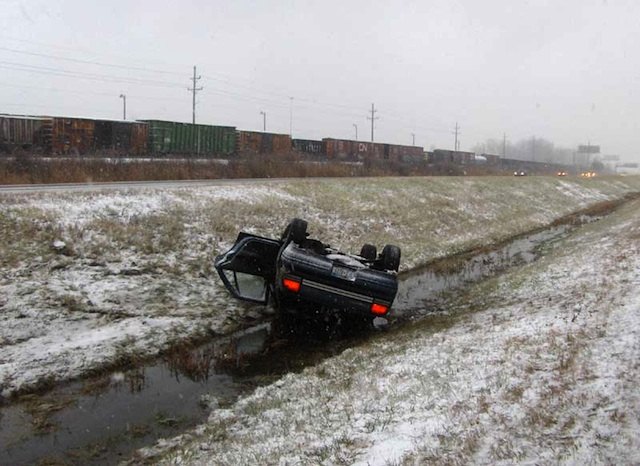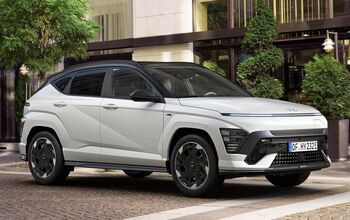NHTSA: ABS Braking Increases "Fatal Run-off-Road Crashes" by 34%
A National Highway Transportation Safety Administration (NHTSA) study on Antilock Braking Systems (ABS) reveals that they’re not all that. In fact, the technology increases fatalities in certain circumstances. (Not that Frank Williams didn’t warn you back in 2006.) “ABS has close to a zero net effect on fatal crash involvements. Fatal run-off-road crashes of passenger cars increased by a statistically significant 9 percent (90% confidence bounds: 3% to 15% increase), offset by a significant 13-percent reduction in fatal collisions with pedestrians (confidence bounds: 5% to 20%) and a significant 12-percent reduction in collisions with other vehicles on wet roads (confidence bounds: 3% to 20%).,” “The Long-Term Effect of ABS in Passenger Cars and LTVs” reports [ download pdf here]. “ABS is quite effective in nonfatal crashes, reducing the overall crash- involvement rate by 6 percent in passenger cars (confidence bounds: 4% to 8%) and by 8 percent in LTVs (confidence bounds: 3% to 11%).” That doesn’t sound . . . confidence inspiring. In fact, that nine percent increase looks even worse close up. A LOT worse.
But previous statistical evaluations of ABS have had ambiguous results. Analyses of data from the early 1990s showed significant increases in fatal run-off-road crashes with ABS, on the order of 28 percent. The increase was baffling, given the success of ABS on the test track. However, at that time, many drivers did not yet know how to use ABS correctly. During the mid-1990s, the safety community worked hard to inform the public about the correct use of ABS (“Don’t let up on the brakes”; “Stomp, stay, and steer”). A second generation of analyses circa 2000 showed much smaller increases in run-off-road crashes that were no longer statistically significant. But they were based on just two or three years of data and left uncertainty about the overall effect of ABS.
A nine percent fatalty increase sounds bad. A twenty-eight percent increase is an epic fail. But we’re not finished here:
On wet, snowy, or icy roads, where ABS is most likely to activate, the increase in fatal run-off-road crashes is a statistically significant 34 percent in passenger cars (confidence bounds: 20% to 50% increase). On these roads, all three types of fatal run-off-road crashes increase significantly for cars and so do fatal rollovers of LTVs.
WTF?
We are still unable to provide a convincing explanation or empirical evidence (other than the crash statistics themselves) for the increase in run-off-road crashes.
The aforementioned Mr. Williams reckons “I still think people don’t understand ABS, and when it starts pulsing and grinding they think something’s wrong and overreact. Maybe instead of spending so much money hyping hybrids, the auto companies need to do some commercials on how the safety systems in their cars work.”
So, is this a whitewash? The report’s emphasis on ABS’ net impact rather and statistical downplaying of ABS’ negative impact certainly should give NHSTA supporters pause. In fact, shouldn’t the NHTSA call for a moratorium on the technology?
But no, the report is suffused with reassurance that the next big thing in safety—federally mandated ESC (Electronic Stability Control)— will sort out the ABS “anomaly.”
Although the preceding analyses show a significant 9-percent increase for ABS on run-off-road crashes of passenger cars, the increase is small relative to the likely benefits of ESC. NHTSA’s 2007 evaluation of ESC, based on statistical analyses through calendar year 2004, found a 36- percent reduction in fatal run-off-road crashes. Thus, the combined effect of ESC and ABS is an estimated 30-percent reduction of fatal crashes.
So that’s alright then? Tell that to the families of drivers and passengers of vehicles where ABS was the difference between life and death, and not in a good way. Either that or just wait for the lawsuit.
More by Robert Farago
Latest Car Reviews
Read moreLatest Product Reviews
Read moreRecent Comments
- SCE to AUX All that lift makes for an easy rollover of your $70k truck.
- SCE to AUX My son cross-shopped the RAV4 and Model Y, then bought the Y. To their surprise, they hated the RAV4.
- SCE to AUX I'm already driving the cheap EV (19 Ioniq EV).$30k MSRP in late 2018, $23k after subsidy at lease (no tax hassle)$549/year insurance$40 in electricity to drive 1000 miles/month66k miles, no range lossAffordable 16" tiresVirtually no maintenance expensesHyundai (for example) has dramatically cut prices on their EVs, so you can get a 361-mile Ioniq 6 in the high 30s right now.But ask me if I'd go to the Subaru brand if one was affordable, and the answer is no.
- David Murilee Martin, These Toyota Vans were absolute garbage. As the labor even basic service cost 400% as much as servicing a VW Vanagon or American minivan. A skilled Toyota tech would take about 2.5 hours just to change the air cleaner. Also they also broke often, as they overheated and warped the engine and boiled the automatic transmission...
- Marcr My wife and I mostly work from home (or use public transit), the kid is grown, and we no longer do road trips of more than 150 miles or so. Our one car mostly gets used for local errands and the occasional airport pickup. The first non-Tesla, non-Mini, non-Fiat, non-Kia/Hyundai, non-GM (I do have my biases) small fun-to-drive hatchback EV with 200+ mile range, instrument display behind the wheel where it belongs and actual knobs for oft-used functions for under $35K will get our money. What we really want is a proper 21st century equivalent of the original Honda Civic. The Volvo EX30 is close and may end up being the compromise choice.


































Comments
Join the conversation
If I am braking hard on the highway at the beginning of a jam, I always use the European custom of switching on the Hazards, I have noticed that trucks do this as well. But I think its helpful, especially if I am in the left lane.